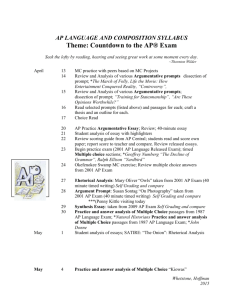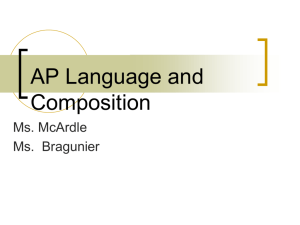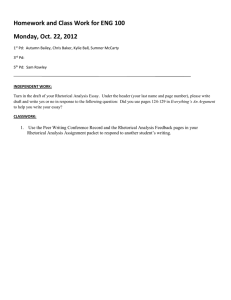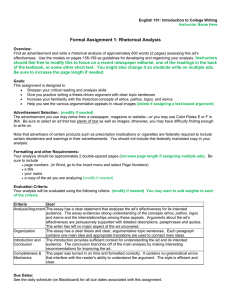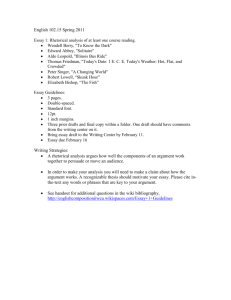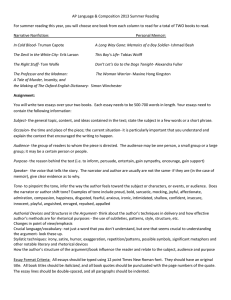ADVANCED PLACEMENT LANGUAGE AND COMPOSITION 2014-2015 Syllabus: Ms. Cox and Mr. Nottingham
advertisement
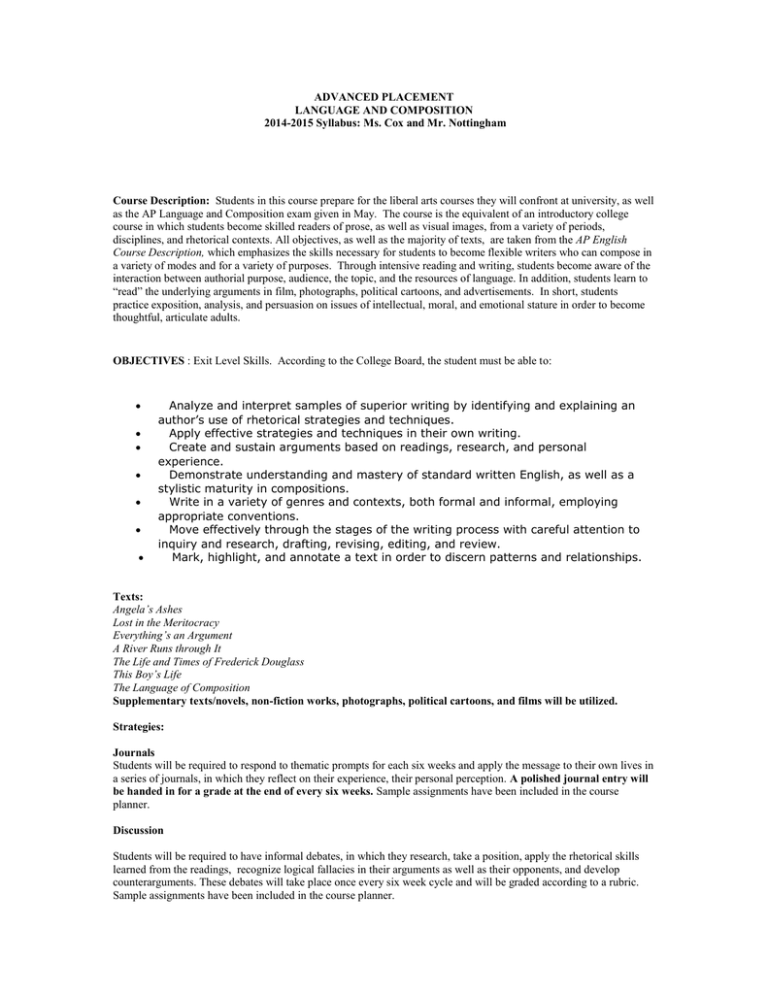
ADVANCED PLACEMENT LANGUAGE AND COMPOSITION 2014-2015 Syllabus: Ms. Cox and Mr. Nottingham Course Description: Students in this course prepare for the liberal arts courses they will confront at university, as well as the AP Language and Composition exam given in May. The course is the equivalent of an introductory college course in which students become skilled readers of prose, as well as visual images, from a variety of periods, disciplines, and rhetorical contexts. All objectives, as well as the majority of texts, are taken from the AP English Course Description, which emphasizes the skills necessary for students to become flexible writers who can compose in a variety of modes and for a variety of purposes. Through intensive reading and writing, students become aware of the interaction between authorial purpose, audience, the topic, and the resources of language. In addition, students learn to “read” the underlying arguments in film, photographs, political cartoons, and advertisements. In short, students practice exposition, analysis, and persuasion on issues of intellectual, moral, and emotional stature in order to become thoughtful, articulate adults. OBJECTIVES : Exit Level Skills. According to the College Board, the student must be able to: Analyze and interpret samples of superior writing by identifying and explaining an author’s use of rhetorical strategies and techniques. Apply effective strategies and techniques in their own writing. Create and sustain arguments based on readings, research, and personal experience. Demonstrate understanding and mastery of standard written English, as well as a stylistic maturity in compositions. Write in a variety of genres and contexts, both formal and informal, employing appropriate conventions. Move effectively through the stages of the writing process with careful attention to inquiry and research, drafting, revising, editing, and review. Mark, highlight, and annotate a text in order to discern patterns and relationships. Texts: Angela’s Ashes Lost in the Meritocracy Everything’s an Argument A River Runs through It The Life and Times of Frederick Douglass This Boy’s Life The Language of Composition Supplementary texts/novels, non-fiction works, photographs, political cartoons, and films will be utilized. Strategies: Journals Students will be required to respond to thematic prompts for each six weeks and apply the message to their own lives in a series of journals, in which they reflect on their experience, their personal perception. A polished journal entry will be handed in for a grade at the end of every six weeks. Sample assignments have been included in the course planner. Discussion Students will be required to have informal debates, in which they research, take a position, apply the rhetorical skills learned from the readings, recognize logical fallacies in their arguments as well as their opponents, and develop counterarguments. These debates will take place once every six week cycle and will be graded according to a rubric. Sample assignments have been included in the course planner. Take Home Essays Students will be required to write and revise one research argument every cycle except the sixth. The prompt will be assigned at the beginning of each cycle with due dates for the background, argument, counterargument, intro, and conclusion, and revision. All essays must adhere to MLA guidelines. Sample assignments have been included in the course planner. Timed Essays Students will practice timed writing using the prompts from old AP Language exams. Each cycle includes 4-6 timed prompts, including the synthesis prompts from the College Board website and Cliff’s 3 rd edition of practice exams. In addition, students practice on multiple choice passages drawn from the College Board website and Cliff’s 3 rd edition of practice exams. Finally, the students take a full length exam on the second Saturday of April. Sample prompts for each cycle are included in the course planner. Writing Workshops and Style Students will be required to participate in writing workshops, which focus heavily on the art of revision. The topics range from reviewing grammatical errors, structure, organization, effective intros, conclusions, diction, and syntax. The lessons are primarily drawn from Kaplan’s SAT Writing Workbook, Ten Lessons in Clarity and Grace, and Dartmouth’s Writing Center handouts. Sample workshops are included in the course planner. Workshops on style involve recognizing and applying specific schemes and tropes, based on the devices emphasized by the readings for that cycle. Sample workshops are included in the course planner. Exposition and Argumentation Students will be required to closely read, annotate, and analyze multiple passages, non fiction works, film, a few novels, primary documents, political cartoons, advertisements, and photographs throughout the year. Strategies, such as OPTIC for visual arguments, and SOAPSTONE will be taught the first cycle and applied throughout the year. Grading – Cycle One Major Assessments: 35% (Exams, Essays, Research Projects) End of Cycle Exam: 25% Summer Reading Test: 25% Assessments: 10% (Quizzes, Vocabulary, Grammar, Devices) Minor Assessments: 5% (Home Work) Grading – Cycle 2-6 Major Assessments: 50% (Exams, Essays, Research Projects) End of Cycle Exam: 25% Assessments: 20% (Quizzes, Vocabulary, Grammar, Devices) Minor Assessments: 5% (Home Work) . Course Planner Cycle One: Theme: The Nature of Education: Purpose and Meaning Timed Writings Analytical considering This Boy’s Life and Angela’s Ashes (Summer Reading) Range finder: read samples from College Board, look at rubrics, work with partner to revise and perfect a midrange essay on rhetorical analysis, the argument, and the synthesis essay. Discussions: Students will discuss the purpose and meaning of education driven by the questions raised in the summer readings. These discussions will include how students are evaluated by universities. What is considered important by students, faculty, districts, and states. The removal of individuality. Competition! What has been learned. Exposition and Argumentation Angela’s Ashes This Boy’s Life Lost in the Meritocracy From Education, Ralph Waldo Emerson A Talk to Teachers, James Baldwin School, Kyoto Mori Writing Workshop Take Home Essay: Students research, draw from their readings, and personal experience to define “the purpose and meaning of education”. Four to six pages with MLA format, text citations, and works cited. Cycle Two Theme: The Nature of Community: Autonomy vs. Cooperation Exposition and Argumentation “Sinners in the Hands of an Angry God”, Jonathan Edwards “Of Plymouth Plantation”, William Bradford “Upon the Burning of Our House, July 10, 1666”, Anne Bradstreet The Crucible Selections from Scarlet Letter AP Language Free response: Scott Russell-Sander’s argument on “dwelling in a web of [communal] relationships” AP Language Free response: Queen Elizabeth’s Address to the Troops Life and Times of Frederick Douglass Writing Workshop Essay: The propaganda prompt from Janet Maslin’s NY Times review of The Crucible, in which she asserts, that the film “now speaks to subtler forms of dishonesty and opportunism than it did before…and becomes free to suggest anything from the impact of religious fundamentalism on politics to the hysterical excess of tabloid television [with] its central concern, the murderous power of lies”. Students research and write an argument on how an event in the last twenty years perfectly captures Maslin’s assertion. Five to seven pages with MLA format, text citations, and works cited. Cycle Three Theme: The Nature of Society: Rights, Roles and Responsibility Discussion In teams of four, students do research and partake in a debate about King’s and Malcolm X’s position on civil disobedience. Each team will be assigned a position and must research specific events in history, which supports their position. The exercise will culminate with a timed essay in which the student must include a counterargument. Style Ten Lessons in Clarity and Grace, Williams Chapter Three: “Actions”. Exercises in class. Recognition and use of parallel structure, antithesis, anastrophe, anaphora, epistrophe, chiasmus, metonymy, analogy, rhetorical question Exposition and Argumentation Patrick Henry- speech in Virginia Convention Various broadsides of the American revolution “Civil Disobedience”, Thoreau “Letter from Birmingham”, King “The Ballot or the Bullet”, Malcolm X Frederick Douglass prompt “What to the slave is the Fourth of July?” Chief Seattle Various Political Cartoons attacking the HUAC activities Writing Workshop Third cycle rubric includes criteria on structure, organization, introduction and conclusion which place the argument in context and engage the reader, predominately active verbs (diction), and syntax . Take home essay: Chapter analysis of the rhetorical styles of King and Malcolm X. The essay will evaluate techniques employed and overall message of each author. Students will be asked to explain which author is more effective. Policies and Procedures: Late Work: Refer to new school wide policy. All students have received a copy on the first day of the school year. Revision Policy: Rationale: All strong writing requires revision or rethinking and rewriting. One of the best ways to learn is to practice the art of revision through one-on-one conferences. Each one of you has writing problems, unique to your piece, that require individualized instruction. Simply reading my comments on your paper will not ensure your growth as a thinker and write. So, I will accept all revisions, if you take the time to conference with me, and average the grades. The Process: Those students eligible to conference and revise are those who handed their papers in on time. Those students may take the following steps to revise their work in order to improve: 1. Schedule an individual writing conference to go over your current draft and discuss potential revisions. 2. Rewrite and implement the discussed revision within one week from the conference date. 3. Schedule one more conference to discuss your new draft. Be sure to bring your original draft. 4. If necessary, rewrite and schedule another conference I will discuss and grade rewrites only with you present - and NOT during class. If you simply revise and resubmit the paper, I will not reassess it Note: If you schedule a writing conference appointment and do not keep it, you may lose the opportunity to revise. BEHAVIORAL EXPECTATIONS (and consequences) The overall guideline to behavior in this class is that everyone has the right to learn in a positive environment, and no one has the right to interrupt the teaching/learning process. Classroom Rules: 1. Respect people: Treat others as you want to be treated. There are to be absolutely no put downs or derogatory comments of any kind. 2. Respect property: Do not touch or take things that do not belong to you. 3. Come to class prepared to work: Bring your pencil, pen, notebook, etc. 4. Do not disturb the learning process. Class work begins as the bell rings. Do not talk or disrupt when the teacher is giving instructions or when anyone else is speaking. Email for Ms. Cox: mcox1@houstonisd.org Email for Mr. Nottingham: mnotting@houstonisd.org Student signature __________________________________________ Parent signature ___________________________________________
